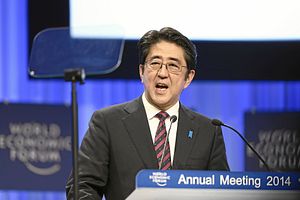The bad news continues for Japanese Prime Minister Shinzo Abe, with the arrest of Yasunori and Junko Kagoike on Monday for fraudulently receiving state subsidies to build an elementary school. Osaka prosecutors arrested the pair on the suspicion for padding figures in their applications for greater subsidies, for example, by stating that their kindergarten had more teachers and more special needs students, and falsifying construction costs.
The Kagoikes ran the Osaka-based educational institution Moritomo Gakuen, which first came under national scrutiny when the nationalist school got a sweetheart land deal from the government. Finance Ministry data shows that Moritomo Gakuen bought the state-owned land for 14 percent of the appraisal price, a discount intended to account for cleanup costs. Abe’s wife, Akie, had been set to become the honorary principal of the new school. Abe had said neither he nor his wife intervened in the land deal, and Akie cut ties with the school after the scandal broke in February.
Abe caught a brief respite on Sunday, however, when the independent candidate backed by his Liberal Democratic Party and its coalition partner, Komeito, won the Yokohama mayoral election. Fumiko Hayashi, who has focused on promoting measuring to reduce the number of children waiting to enter nurseries and attracting large companies to the city, will serve a third four-year term.
Thursday provides another chance for Abe to staunch the bleeding with his much-anticipated Cabinet reshuffle. Much of the drama of “will he or won’t he” has been taken out, now that former Defense Minister Tomomi Inada resigned and Abe does not need to make a decision on the matter. Key Abe allies – including Chief Cabinet Secretary Yoshihide Suga and Deputy Prime Minister Taro Aso in the Cabinet, and Secretary General Toshihiro Nikai and Vice President Masahiko Komura in the Party leadership – are likely to retain their posts. Former Defense Minister Itsunori Onodera is likely to join the new Cabinet. Ministers involved in recent cronyism scandals and unable to defend key legislation adequately will be replaced.
So, what should you watch? Keep an eye on where Foreign Minister Fumio Kishida (who has also temporarily picked up Inada’s portfolio until Thursday) ends up – whether he keeps his current Cabinet post or gets a Party position, such as Policy Research Council chairman. Also, watch to see how members of Kishida’s faction get appointed, as it could be an indicator of what concessions Abe had to make to retain Kishida’s support. Earlier media speculation had raised the possibility of Shinjiro Koizumi, the son of popular former Prime Minister Junichiro Koizumi, gaining a post, but such talk has since faded.
Suga commented, “A new Cabinet will continue promoting policies advocated by the administration, making the economic revitalization its top priority [emphasis added].” As Abe oscillates between his hawkish and pragmatic tendencies, his low numbers are yet another wake up call that it’s the economy the voters care about.

































